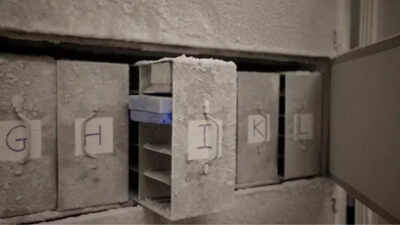ARTICLE AD BOX

Credit: Microbiota Vault Initiative
It may sound like a headline from a science fiction novel—or clickbait—but it’s absolutely real: scientists in Switzerland are deep-freezing human feces in what’s being called a “doomsday vault.
” The project aims to preserve microbial life for future generations, and over 1,000 fecal samples have already been stored, with a goal to reach 10,000 by 2029.But why, you might ask, are scientists so interested in saving poop? The answer lies in the invisible universe living inside it.
Microbes: Small organisms, big impact
Human feces contain billions of microbes—tiny organisms that play an essential role in digestion, immunity, and overall health.
According to a commentary published Friday (June 27) in Nature Communications, scientists want to ensure these microbial communities are not lost over time. These microbes may hold the key to treating future medical conditions and responding to global health crises.The Swiss facility doesn’t stop at human waste. It also stores nearly 200 types of fermented foods, which are rich in “gut-friendly” microbes. The team even plans to include environmental microbes, creating a comprehensive archive of microbial life that supports human, animal, plant, and ecosystem health.

Why microbial preservation matters
“Our microbiome is under threat,” wrote the researchers behind the project. “Microbe loss is associated with an alarming rise in chronic diseases, such as allergic, autoimmune, and metabolic disorders.”Human actions—such as industrial agriculture, widespread antibiotic use, and climate change—are disrupting microbiomes everywhere. From thawing permafrost to depleted farmlands, ecosystems are losing microbial diversity at a rapid pace.
Preserving samples today could allow scientists tomorrow to restore what’s been lost.Dr. Martin Blaser, director of the Center for Advanced Biotechnology and Medicine at Rutgers University and co-author of the commentary, emphasized this urgency: “Human activities are depleting our microbiome, and there’s lots of evidence of that.”
A microbial ark for the future
Launched in 2018, the Microbiota Vault was inspired by Norway’s Svalbard Global Seed Vault, which protects plant diversity from extinction.
In its initial “launch” phase, the Microbiota Vault focused on testing the logistics of collecting and preserving microbial samples from around the world.

So far, researchers have collected 1,204 fecal samples and 190 fermented food samples from countries including Benin, Brazil, Ethiopia, Ghana, Laos, Thailand, and Switzerland. These are currently stored at −112°F (−80°C) at the University of Zurich.Now, the initiative is entering its “growth” phase.
The goal is to expand the collection to include thousands more samples—especially from vulnerable ecosystems—and to establish a permanent vault location, preferably in a cold climate such as Switzerland or Canada.While there’s no guarantee that reintroducing frozen microbes will successfully restore a damaged microbiome, scientists believe future technologies will make this possible.“We believe that one day the science will improve sufficiently so that we will have really good restorative techniques,” said Blaser.



.png)
.png)
.png)
















 4 hours ago
3
4 hours ago
3









 English (US) ·
English (US) ·